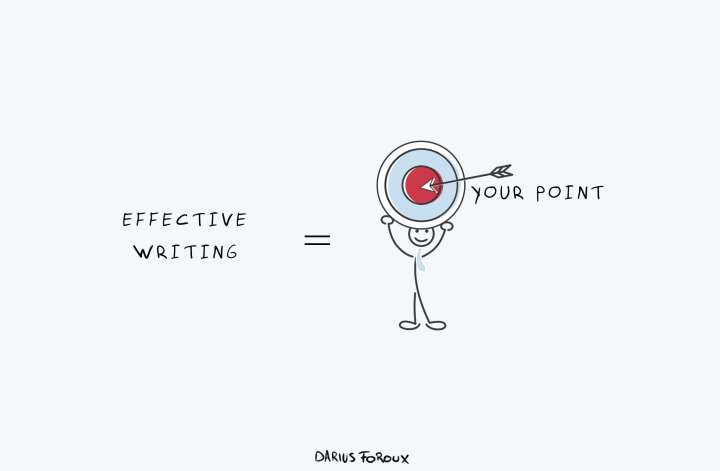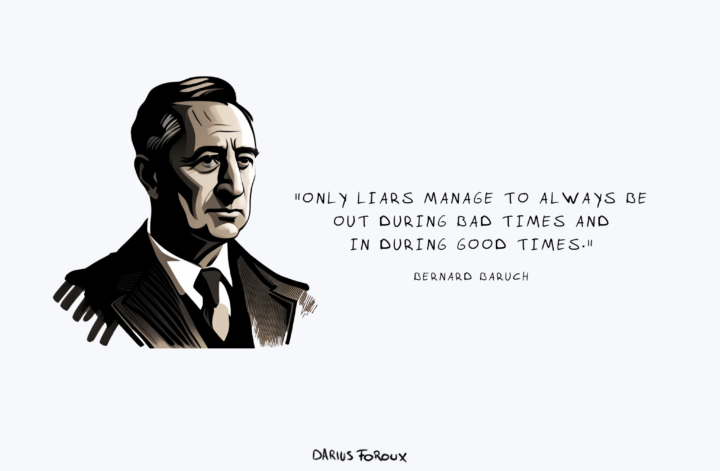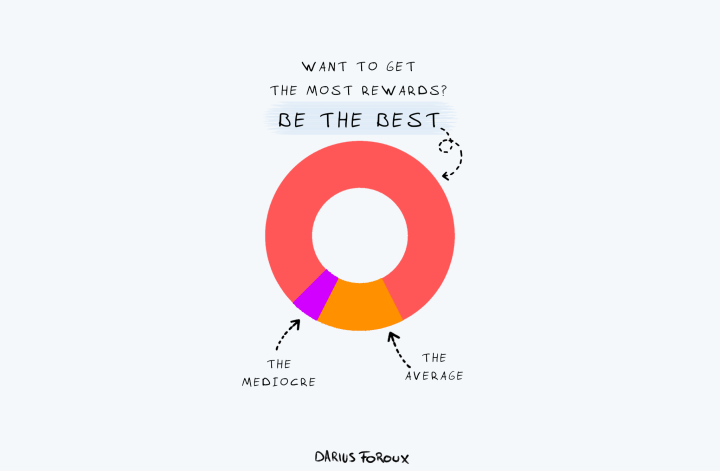20 years ago, being able to get rich as a fully-independent writer would’ve been close to impossible. Today’s technology and the internet changed all that.
But that also means more people can access these opportunities. Everyone can post online, which is what makes it also competitive.
But with the right strategy and dedication, it’s definitely doable to earn a good living. I started blogging in 2015. About three years later, I started generating six figures of profit a year. I’ve used that profit to invest and generate a net worth of seven figures.
I share this to say it’s possible. You can get rich as a writer. And to be honest, you can get rich in any profession if you’re serious about learning the skills you need to succeed.
The tips I’m about to share aren’t get-rich-quick fixes. These things take serious work and commitment.
1. Become the best
The best at anything get the highest rewards. But that doesn’t mean we all need to be the next Stephen King or JK Rowling. They are the best in a very broad category.
Instead, we can be the best in our own little category on the big world of the internet. Business author, Seth Godin, gives a great idea of what being the best means in his book, The Dip.
“The Best in the World? Anyone who is going to hire you, buy from you, recommend you, vote for you, or do what you want them to do is going to wonder if you’re the best choice. Best as in: best for them, right now, based on what they believe and what they know. And in the world as in: their world, the world they have access to.”
Let’s say I’m looking for a new editor for my articles. The best editor for me would be someone who edits in English, who’s available, understands my style, collaborates well, and has a rate that’s aligned with my budget.
The editor who tops those criteria is, for me, the best person. That applies to all kinds of writing. Whether you’re a fiction novelist, a business author, and so forth.
What kind of writing would your target audience consider to be the best in their world? Achieve that, and market yourself effectively, and you’ll reap the best rewards.
2. Be in control of your career
When I started, I didn’t like the system of getting an agent, waiting for the agent to get a publisher, and so forth. It’s just too much waiting and dependency.
That’s also why I don’t like to be tied to platforms. For example, I’ve been publishing on Medium for many years. It’s a good platform with great readers.
But Medium has gone through many changes over the years; some played out well for me, others didn’t. And because I don’t rely on Medium for my income, I don’t mind what happens.
Over the years, I’ve built my own audience and digital products. Now that I have more ownership and control over my career, I don’t have to chase after opportunities.
I’ve recently closed a great book deal with Portfolio/Penguin, one of the major publishing houses for business books. Without my existing audience and body of work, I don’t think I would get a deal like this one.
Wealth is all about freedom. And freedom is bought with options. When you know you’re in a good position, you can pick only the best offers.
3. Offer something different
People sometimes misinterpret what “different” means.
You don’t need to reinvent the wheel. I always tell my business course students: If you’re creating something entirely new, you’re either making the next big thing (like Amazon, Apple, Instagram), or you’re making something nobody actually would pay for (which is more likely).
The writer, Austin Kleon, explains the idea of originality well. In his book, Steal Like an Artist, he says:
“All creative work builds on what came before. Nothing is completely original… Every new idea is just a mashup or a remix of one or more previous ideas.”
Just take a look at a mirror. It’s a great example of “originality.” Your features, personality, and such, are a combination of your parents and your past ancestors. Yet, you’re a different person altogether.
The important thing is to look at what your audience needs and give them a unique solution. That’s how Uber revolutionized the old idea of public transportation. Or how newsletter writers like Ben Thompson of Stratechery can earn millions from subscription fees alone.
The offer is not entirely new. But they solve old problems in a unique, efficient, and effective way.
4. Focus on consistent growth
Even if the first book you write becomes an instant bestseller, it likely won’t be enough to sustain you for the next decades. You’ll need to reach more new readers over time.
This means consistency in producing new works:
- New books
- New blog articles
- New products, etc.
This is true even for the top 1% of writers. As a bookstore owner once told Chuck Palahniuk:
“If you want to make a career out of this you’ll need to bring out a new book every year. Never go longer than sixteen months without something new because after sixteen months people quit coming in that door and asking me if you have another book yet.”
And the power of compounding applies. As his new books attract new readers, his audience increases over time and compounds his success.
I find that to be the case for me as well. Every month, thousands of new readers find my articles which I consistently publish every week. Some of them would buy the books and courses I released years ago.
Everything builds on top of each other.
5. Have additional income streams
Aside from the money, the real benefit of having multiple income streams is the psychological effect. When people are too reliant on a single income stream, like a job or even a business, they’re trapped by fear.
The fear of losing one’s main income source is real. As the pandemic has shown, there’s no such thing as a “guaranteed” income.
But as writers, we have plenty of options.
- You can start blogging or writing your first book on the side while working a day job
- Then you can use your book or blog to build your writing career
- When you’ve established yourself as an expert in your field, you can start offering courses, consulting gigs, speaking engagements, and so forth.
These things take time. So be patient with yourself. The important thing is to take the first step.
6. Re-invest your earnings
Earning money from writing is one of the most exhilarating feelings. After all, it’s hard to earn good money from writing.
One of my favorite fiction novel authors is Charles Bukowski. Bukowski’s stories are funny in a crass way. The L.A. Times once called him, “the poet laureate of L.A. lowlife.”
True to his title, Bukowski describes the writer’s life in his typical, skeptic manner:
“Lawyers, doctors, plumbers, they all made the money. Writers? Writers starved. Writers suicided. Writers went mad.”
Every buck we earn from writing is precious. We can’t afford to spend it on useless things.
That’s why I re-invest my earnings back into my writing. I think that’s the best way to spend one’s writing income. This could mean investing in an online course to improve my writing skill, or actually putting it in the S&P 500 index fund where it can grow exponentially over time.
By investing my earnings, I feel good about my future and lifestyle. That’s much better than if I used my writing income to buy the latest car or gadget.
Writing income goes beyond writing
Writing is a skill. And people who use the written word effectively can eventually earn six figures as a writer. Gone are the days when “writing” is done only by reclusive, bearded weirdos who never go out of their house.
Now, everyone actually needs to write well. We do that every day in our chats, emails, social media posts, and so forth. It’s a form of thinking. We’re almost always trying to get a message across or persuade people to do something.
I’ve become a better investor and entrepreneur as I became a better writer. When you invest in your writing skill, you improve your chances in all facets of life.




